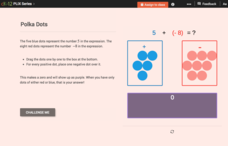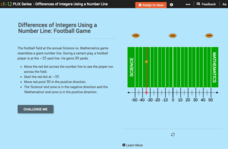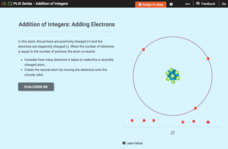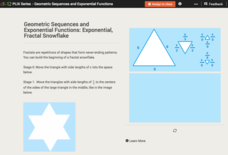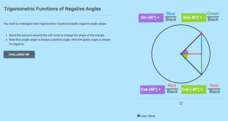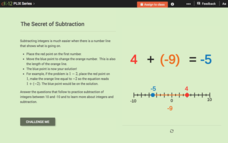CK-12 Foundation
Sums of Integers with Different Signs: Board Game
Five questions challenge scholars to show what they know about integers. Using an interactive board game, learners move pieces to discover where a player landed, then answer problems involving both positive and negative integers.
CK-12 Foundation
Addition of Integers: Polka Dots
What happens when you add negative and positive integers to one another? Do you add or subtract, and will the answer be positive or negative? Young mathematicians use blue and red polka dots to determine the value of an expression that...
CK-12 Foundation
Differences of Integers Using a Number Line: Football Game
Make football a math sport! Move the football player (red dot) along the sideline (number line) to see how many yards (positive and negative integers) they've traveled to the other team's end zone.
CK-12 Foundation
Addition of Integers: Adding Electrons
Young mathematical scientists interact with protons and electrons in an atom to create a neutrally charged atom. They answer questions based on their findings throughout the interactive resource.
CK-12 Foundation
The Real Numbers: Size of Infinite Sets
The learning opportunities with the resource on infinity are finite, but it's still good to use. Individuals investigate the size of the set of integers and the set of even integers. Conclusion: the two sets have the same size.
CK-12 Foundation
The Real Numbers: Adding Electrons
Get a charge out of a great resource! Scholars use an interactive to explore addition and subtraction of integers. They add or remove electrons in an atom model to consider its charge.
CK-12 Foundation
Geometric Sequences and Exponential Functions: Bouncing Ball
Explore a geometric sequence model through a simulation. Learners change the starting drop height of a ball and watch how the heights of following bounces change. They consider the ratio of the consecutive bounces as they analyze...
CK-12 Foundation
Exponential Growth: Exponential, Fractal Snowflakes
Examine an exponential growth model. Using a fractal, learners calculate the perimeters of each stage. When comparing the consecutive perimeters, a pattern emerges. They use the pattern to build an equation and make conclusions.
CK-12 Foundation
Trigonometric Functions of Negative Angles
When is the trigonometric value of a negative angle the same as the positive angle? Pupils compare the values of trigonometric functions for different angles and their negatives. The interactive resource provides a visual display to make...
CK-12 Foundation
Square Roots and Irrational Numbers: Estimating Radicals
Try out a resource using triangles to estimate radicals. An interactive app allows learners to approximate some irrational numbers involving square roots. They find the two consecutive numbers that an irrational number lies between...
CK-12 Foundation
Properties of Real Number Addition: The Secret of Subtraction
Learners sometimes struggle to understand the concept of adding and subtracting integers. Help them see the why behind their answers using the interactive number line. The values change as individuals adjust the number line for each new...
CK-12 Foundation
Sums of Finite Arithmetic Series: Triangular Numbers
Using a slider, scholars build triangular numbers and their associated rectangles and use the geometric display to find the pattern to determine the next triangular number. They then relate that number to the area of the rectangle to...
CK-12 Foundation
Inequalities that Describe Patterns: Freezing Cold Comparison
Don't freeze out the interactive on inequalities from your lesson plans. Young mathematicians use an interactive thermometer and number line to compare freezing temperatures. Inequalities help express these comparisons.
Other popular searches
- Negatives
- Negative Integers
- Multiplying Integers
- Dividing Integers
- Adding Subtracting Integers
- Subtracting Integers
- Multiply Divide Integers
- Integers and Absolute Value
- Double Negatives
- Positive and Negative Integers
- Subtraction of Integers
- Negative Number

